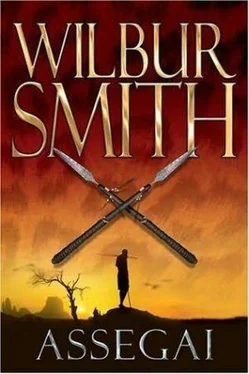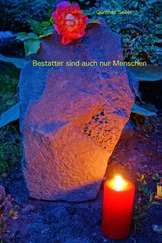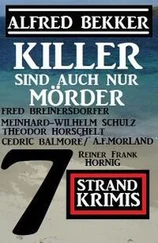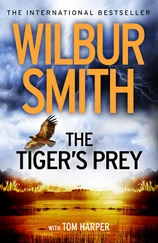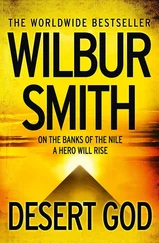Then she went to Kermit and, with the giraffe-tail switch, sprinkled the blood and milk on his bowed head. ‘The game will never escape him, for he has the heart of the hunter. Let him follow his quarry unerringly. May it never escape his hunter’s eye.’
Leon whispered the translation to Kermit, and after each sentence she spoke, they clapped and said the refrain to her prayer: ‘Even as the great black cow speaks, let it be so.’
Lusima began to dance, whirling in a tight circle, her bare feet like those of a young girl, her sweat mingled with the oil and ochre until she glowed like a carving of precious amber. At last she collapsed on the lionskin and her face contorted. She bit her lips until blood ran down her chin. Her whole body juddered and shook, her breath sawing and rasping in her throat, froth coating her lips and mingling pinkly with the blood. When she spoke her voice was as thick and hoarse as a man’s: ‘The hunter makes his way homewards. The clever hunter listens to the cheeping of the small black birds in the dawn,’ she grated. ‘If he waits on the hilltop the hunter will be thrice blessed.’ She gasped and shook herself as a hunting spaniel does when it clambers from the water on to the riverbank.
‘Well, your mama’s clues were fairly cryptic,’ Kermit remarked drily, as they ate the dinner of roasted porcupine, as tender and juicy as a sucking pig, that Ishmael had provided. ‘Was she telling me to give it up and go home, do you think?’
‘Didn’t your Indian shaman teach you that when you’re dealing with occult prediction you have to consider every word for its possible associations? You cannot take anything literally. To give you an example, last time I asked for her help, Lusima told me to follow the sweet singer. This turned out to be the bird called a honeyguide.’
‘She seems to be something of an ornithologist, but she gave us black birds instead of honeyguides.’
‘Let’s start at the beginning. Did she tell you to go home or to go homewards?’
‘Homewards! My home is in New York, USA.’
‘Well, that would give us a bearing of north-west by north and a touch north, I reckon.’
‘In the absence of any other suggestions we’ll have to give that a go,’ Kermit agreed.
Leon navigated on the army-issue compass he had liberated when he left the KAR, and they camped that first night under the lee of a small rocky kopje. Just before dawn they were drinking coffee while they waited for the sun. Suddenly Loikot cocked his head and held up his hand for silence. They stopped talking and listened. The sound was so faint that it was only fitfully audible when the morning breeze dropped a little or veered favourably.
‘What is it, Loikot?’
‘The chungaji are calling to each other.’ He stood and picked up his spear. ‘I must go up the hill so I can hear what they are saying.’ He slipped away into the darkness, while they listened to the distant sounds.
‘They don’t sound like human voices,’ Kermit said, ‘more like the piping of sparrows.’
‘Or the cheeping of little black birds?’ Leon asked. ‘Lusima Mama’s little black birds?’
They burst out laughing.
‘I think you have it. Loikot will have news for us when he comes down the hill.’
They heard him calling, closer and clearer than the other voices, and the exchange of news on the Masai grapevine continued until after the sun was well clear of the horizon. Then, at last, there was silence as the wind and rising heat made further discourse unintelligible. Soon after this Loikot returned. He was puffed with self-importance. It was clear that he was not going to speak until someone pleaded with him to do so.
Leon humoured him. ‘Tell me, Loikot, what did you and your brothers of the circumcision knife speak about?’
‘There was much talk about the safari of ten thousand porters and many wazungu camped on the Ewaso Ng’iro river and the great killing of animals by the king of a land called Emelika.’
‘After this what did you speak about?’
‘There has been an outbreak of red-water disease among the cattle near Arusha. Ten have died.’
‘Is it possible that you also discussed the movement of elephant in the Rift Valley?’
‘Yes, we spoke of that,’ Loikot replied. ‘We all agreed that this is the season when the big bulls come down into the Rift. In recent days the chungaji have seen many in the land between Maralal and Kamnoro. There was talk of three travelling eastwards in one herd, all very big.’ Then, at last, he broke into a smile, and his voice took on an urgent cadence. ‘If we are to catch them, M’bogo, we must go quickly northwards to cut them off before they move on into Samburuland and Turkana.’
Manyoro and Loikot ran ahead of the horses with the long loping stride they referred to as ‘gobbling up the earth greedily’. The two horsemen trotted behind them, then Ishmael, further back, riding one mule and leading the other on which were loaded all his pots, pans and supplies.
Kermit was in his usual irrepressible mood. ‘A good horse between your legs, a rifle in your hand and the promise of game ahead! Son of a gun, this is the life for a man.’
‘I can’t think of anything I’d rather be doing,’ Leon agreed.
Kermit reined in suddenly and shaded his eyes with his hat to look out to one side at a patch of grey thorn scrub. ‘That’s a big kudu bull over there,’ he said. ‘Bigger than any that Mellow got for me.’
‘Do you want another kudu, or do you want a cracking hundred-pounder jumbo? Make up your mind, chum. You can’t have both.’
‘Why not?’ Kermit demanded.
‘The big bull elephant with your name branded on his backside may be just over the next rise. You fire a shot here and he’ll take off at a rate of knots. He won’t stop running until he gets across the Nile.’
‘Spoilsport! You’re as bad as Goddamned Frank Mellow.’ Kermit kicked his horse into a canter to catch up with the two Masai, who had pulled well ahead.
In the middle of the afternoon a line of low hills pushed their crests over the flat horizon, resembling the knuckles of a clenched fist. They camped that night below the tallest. Before dawn the next morning they drank coffee around the fire, then left Ishmael with the horses to break camp and pack his mule while they climbed to the summit of the hill. When they reached it Loikot sang out across the valley. He was answered almost immediately by a similar but distant cry coming out of the remaining shreds of the night. The exchange went on for some time before he turned to Leon. ‘That one I was speaking to is not Masai. This is the border between our land and the Samburu,’ Loikot told him. ‘He is half a Samburu, the tribe who are our bastard cousins. They speak Maa but not as we do. They speak it in a funny way, like this.’ He rolled his eyes and made an idiotic hee-hawing sound, like a demented donkey. Manyoro thought this was hilarious and staggered around in a circle, slapping his cheeks and repeating the imitation of a Samburu speaking Maa.
‘Now that you two clowns have had your little joke, will you tell us what your bastard cousin the Samburu had to say?’
Still gasping and hiccuping with merriment, Loikot answered, ‘The Samburu donkey says that last evening as they were driving the cattle into the manyatta they saw the three bulls. He says that every one of them has very long white teeth.’
‘Which way were they heading?’ Leon demanded eagerly.
‘They were coming straight up this valley, towards where we are now.’ Quickly Leon translated this news to Kermit, and watched his eyes light up. ‘So if I’d let you shoot that kudu yesterday you would have blown away any chance we ever had of catching them.’
Читать дальше
